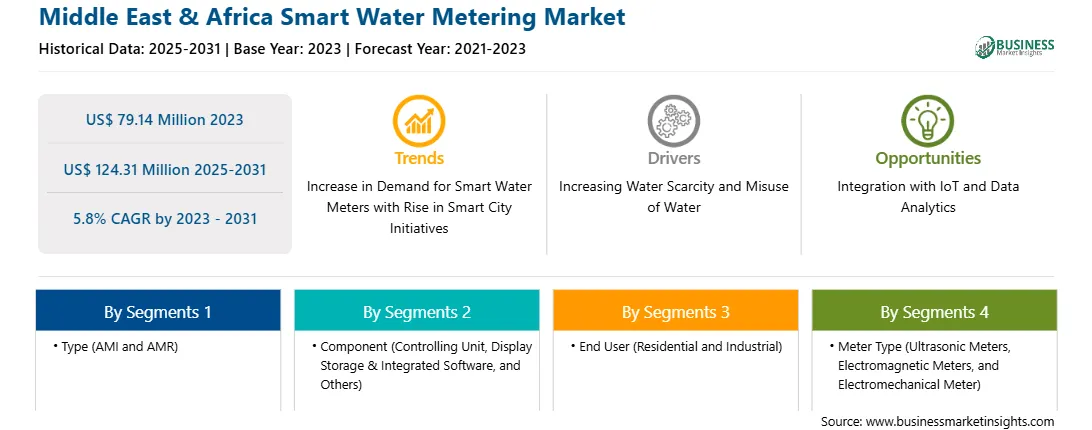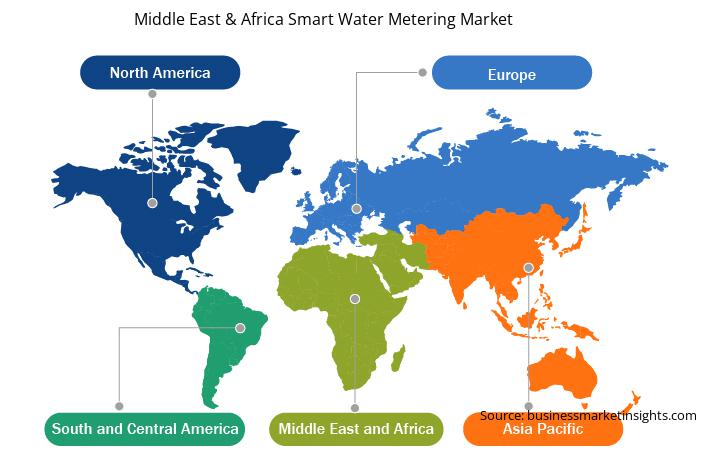Increasing Number of Smart Water Meter Projects is Driving the Middle East & Africa Smart Water Metering Market
One of the most crucial pieces of a city is its water supply system. With the increasing population, it is inevitable anticipated that the demand for water consumption will increase exponentially. A city’s water distribution channel and management systems have to be viable over a longer period of in order to maintain consistent growth and should be integrated with technologies that are capable to monitor and check water loss issues. Various developed and developing nations across the globe are witnessing a paradigm shift to smart cities. The government of various countries are adopting the momentum of smart cities thereby, investing in the development of internet infrastructure in the countries with an aim to bring robust urbanization. The demand for smart water meter is anticipated to witness an exponential growth in these smart cities as the smart city initiatives majorly focus on the energy sector. The water utilities in all countries cater to energy sectors as the energy generation sector is one of the prominent consumers of water. Pertaining to the advancement of energy sectors in smart cities, the future for smart water meters is also anticipated to be promising.
The Middle East & Africa in known to be a region with two halves of economies. The Gulf countries are economically developed countries, whereas the African countries are yet to match up to the economic conditions of the Gulf countries and lag far behind. Poor economy and access to poor internet connectivity are the major reasons for low smart water meter technological trials and rollouts in the region. The Middle East & Africa, a region encompassing more than 70 countries, faces extreme market variations in terms of Information and Communication Technology (ICT) maturity. As developed nations in the Middle East, Saudi Arabia and the UAE move ahead with smart water meter implementation plans, while countries in Africa are eyeing to catch up with the modern technologies. Evolving consumer behavior, rapid industrialization, government ambitions, and changing economic condition in the Middle East & Africa are the factors driving the growth of emerging technologies. The opportunities have been identified in the growth in data access and in digital services, such as M2M/IoT, mobile financial services, content and digital media, enterprise ICT services. High penetration of technology and IoT is poised to influence in the metering infrastructures and thereby boost the adoptions of smart water meters by the residential and industrial sectors in the region.
Strategic insights for the Middle East & Africa Smart Water Metering provides data-driven analysis of the industry landscape, including current trends, key players, and regional nuances. These insights offer actionable recommendations, enabling readers to differentiate themselves from competitors by identifying untapped segments or developing unique value propositions. Leveraging data analytics, these insights help industry players anticipate the market shifts, whether investors, manufacturers, or other stakeholders. A future-oriented perspective is essential, helping stakeholders anticipate market shifts and position themselves for long-term success in this dynamic region. Ultimately, effective strategic insights empower readers to make informed decisions that drive profitability and achieve their business objectives within the market.

| Report Attribute | Details |
|---|---|
| Market size in 2022 | US$ 72.03 Million |
| Market Size by 2028 | US$ 109.05 Million |
| Global CAGR (2022 - 2028) | 7.2% |
| Historical Data | 2020-2021 |
| Forecast period | 2023-2028 |
| Segments Covered |
By Type
|
| Regions and Countries Covered | Middle East and Africa
|
| Market leaders and key company profiles |
The geographic scope of the Middle East & Africa Smart Water Metering refers to the specific areas in which a business operates and competes. Understanding local distinctions, such as diverse consumer preferences (e.g., demand for specific plug types or battery backup durations), varying economic conditions, and regulatory environments, is crucial for tailoring strategies to specific markets. Businesses can expand their reach by identifying underserved areas or adapting their offerings to meet local demands. A clear market focus allows for more effective resource allocation, targeted marketing campaigns, and better positioning against local competitors, ultimately driving growth in those targeted areas.

Middle East & Africa Smart Water Metering Market Segmentation
The Middle East & Africa smart water metering market is segmented into type, component, application, and meter type, and country.
On the basis of type, the Middle East & Africa smart water metering market has been segmented into advanced metering infrastructure and automatic meter reader. The automatic meter reader segment registered the largest market share in 2022.
On the basis of component, the smart water metering market has been segmented into controlling units, display/storage and integrated software, and others. The display/storage and integrated software segment held the largest market share in 2022.
On the basis of application, the Middle East & Africa smart water metering market has been segmented into residential and industrial. The residential segment held the largest market share in 2022.
On the basis of meter type, the Middle East & Africa smart water meter has been segmented into ultrasonic meters, electromagnetic meters, and electromechanical meters. Ultrasonic meters segment held the largest market share in 2022.
Based on country, the Middle East & Africa smart water metering market is segmented into Saudi Arabia, South Africa, the UAE, and the Rest of Middle East & Africa. Saudi Arabia dominated the market share in 2022.
Arad Ltd; Badger Meter Inc; Bmeters SRL; Diehl Stiftung & Co KG; Itron Inc; Kamstrup AS; Mueller Water Products Inc; Sensus USA Inc; WAVIoT Integrated Systems LLC are the leading companies operating in the Middle East & Africa smart water metering market.
The Middle East & Africa Smart Water Metering Market is valued at US$ 72.03 Million in 2022, it is projected to reach US$ 109.05 Million by 2028.
As per our report Middle East & Africa Smart Water Metering Market, the market size is valued at US$ 72.03 Million in 2022, projecting it to reach US$ 109.05 Million by 2028. This translates to a CAGR of approximately 7.2% during the forecast period.
The Middle East & Africa Smart Water Metering Market report typically cover these key segments-
The historic period, base year, and forecast period can vary slightly depending on the specific market research report. However, for the Middle East & Africa Smart Water Metering Market report:
The Middle East & Africa Smart Water Metering Market is populated by several key players, each contributing to its growth and innovation. Some of the major players include:
The Middle East & Africa Smart Water Metering Market report is valuable for diverse stakeholders, including:
Essentially, anyone involved in or considering involvement in the Middle East & Africa Smart Water Metering Market value chain can benefit from the information contained in a comprehensive market report.